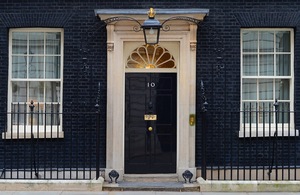The relationship between the UK and a critical Indo-Pacific partner will be signed by the Prime Minister and the President of the Republic of Korea this week.
The Downing Street Accord, which follows the signing of similar partnerships with Singapore and Japan earlier this year, will deepen the relationship between the UK and South Korea, and see the two countries step up cooperation on technology, defence and security.
President Yoon Suk Yeol will began his three-day state visit which will include a bilateral with the Prime Minister and signing of the Accord at Downing Street. The visit coincides with 140th anniversary of diplomatic relations between the UK and Korea, as well as the 70thanniversary of the armistice of the Korean war.
Trade and investment is expected to be a key focus of the visit, with the Prime Minister set to host key Korean investors at Downing Street this evening, and Trade Secretaries from both countries preparing to sign an agreement to launch the negotiations for an upgraded modern, world-leading Free Trade Agreement.
A future-proofed FTA, fit for the technology driven landscape of the coming decades, will pave the way for new digital trade and rules of origin chapters and look to streamline existing complex arrangements, as well as digitising customs procedures.
Already the world’s 13th largest economy, the Republic of Korea has around 45 million middle class consumers and an import market expected to grow by 45% by 2035. Trade between both countries has more than doubled since the first FTA was agreed in 2011, with the exchange of goods and services now worth £16bn a year.
The launch of negotiations comes as South Korean businesses commit more than £21 billion of new investment into the UK, backing renewable energy and infrastructure projects across the country, and a further £3bn worth of trade. The trade and investment boost will support more than 1500 highly skilled jobs. The major investment pledge fires the starting gun on the Government’s flagship Global Investment Summit being held in London next week.
The investment also underpins a new Clean Energy Partnership between the UK and Korea, which will drive efforts to triple renewable energy capacity globally. The partnership will also see accelerated collaboration on a large scale, small scale and advanced civil nuclear reactors, reinforcing resilience on energy grid infrastructure, and exploring opportunities on hydrogen collaboration and offshore wind.
Prime Minister Rishi Sunak said:
Long term, global partnerships are vital to our prosperity and security, both today and in the future. As two nations focussed on innovation, harnessing new technologies and defending the international rules-based order, the UK and Republic of Korea are natural partners.
Through our new Downing Street Accord, we will drive investment, boost trade and build a friendship that not only supports global stability, but protects our interests and lasts the test of time.
These close ties have already propelled £21 billion of investment between our countries, and I know a Free Trade Agreement fit for the future will only drive further investment, delivering on my promise to grow the economy and support highly skilled jobs.
The future-focussed Accord also includes agreements to work closer together to harness the potential of critical technologies like AI, quantum and semiconductors to create jobs and unlock economic growth, alongside up to £4.5 million in joint research funding, led by the Royal Society.
It comes after the UK handed over the baton for next year’s AI Safety Summit to South Korea to co-host the 2024 conference, following the inaugural Bletchley Park summit earlier this month.
Innovate UK will also invest more than £8.5 million, matched by Korean agencies, creating joint innovation programmes with the Republic of Korea, driving the development and commercialisation of critical technologies, including for the first time – semiconductors. This investment will improve the supply chain resilience of semi-conductors, which are essential to everyday technology, including phones, computers, cars and hospital equipment. for the long-term.
Defence cooperation and shoring up the security of the Indo-Pacific is also expected to be on the agenda for this week’s visit, with both countries’ militaries pledging to step up joint training and operations to create the most comprehensive exercise regime between the UK and any partner other than the US.
Under the Accord, the Republic of Korea is also expected to agree to join with British ships on sanctions patrols, authorised by the UN Security Council, to uphold of the rule of law in the region. The DPRK relies on illegal smugglers in order to bypass international sanctions, many of which were introduced to block imports and exports which could be used to support its nuclear weapons programme.
The enforcement action will be the first bilateral sanctions action the two nations have conducted together against the DPRK, and paves the way for multilateral sanctions operations with the US and other allies in the future.
That enforcement action will be underpinned by new defence and cyber partnerships, which will strengthen defence industry and intelligence agency ties. The cyber partnership will bolster both countries’ ability to detect, disrupt and deter malicious actors, while the defence partnership will improve industrial collaboration and supply chain integration, allowing for greater defence capability development.
Science ministers from both countries are also expected to sign a new Memorandum of Understanding on space cooperation, bringing our space industries closer together and paving the way for joint space endeavours. The UK and South Korea will work together on satellites, tackling space debris and earth observation technology.

















